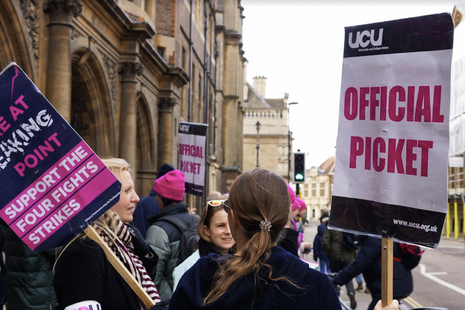Strike action is better than no action
The expectation of perfection in activism has often paralysed us into doing nothing, says columnist Bella Cross

Like many others, I followed the student discussions around the recent strikes a little too intensely. Much of the animosity towards the strikes — and the adjacent occupation of the lecture block on the Sidgwick site by students in solidarity with the strikes — seemed to stem from the idea that although the strikes had valid aims in theory, they were unlikely to achieve much. I think this expectation of immediate gratification is partly a product of the cultural changes resulting from technology and social media that have programmed us in this way. It’s more comfortable and satisfying to make demands that are easy to meet — but what really comes from this is performative and superficial change. I think this idea — “it’s never going to work, so why even try?” — is purported to justify our own inaction. The anger towards the strikes was misdirected.
“It is through action that we learn lessons working alongside one another and building solidarity”
The recent wins by UCU, first in its official recognition by the university and second in winning mandatory pay for training for supervisors, demonstrate that there is merit in strike action, and staff are right to demand better working conditions. These wins offer us hope that by joining in solidarity with our supervisors, peers, and colleagues, we can tackle an institution with as much power as the University.
I want to start by reiterating that students had legitimate grievances with the loss of teaching. Students, in recent years have been objectified by the government and landlords as cash cows and a financial resource to be extracted from — clearly demonstrated by the recent announcement in a hike in student loan repayments, the potential for this to rise further and the appalling treatment of students during Covid. The marketisation of higher education has driven us to such a crunch point that this is the reality of the situation. Moreover, at Cambridge, the expectations of constant outstanding academic performance are enough to give anyone anxiety. It’s hardly surprising, therefore, that with this economic tension and the stress of meeting standards, students feel hard done by at the further disruption to their learning.
However, it’s increasingly frustrating to witness, especially from people who consider themselves to sit on the left of the political spectrum, to come out to criticise strike action, all guns blazing. This seems to be a theme within the wider political climate as well, as clear from a glance at the behaviour of the likes of Keir Starmer too, where the desire to prove among centre leftists that they aren’t ‘irrational’ or ‘utopian’ leftists leads to a level of criticism that means more energy is spent policing, analysing, and criticising the success of this activism, than actually doing anything to attempt to improve the conditions we exist in. For those who sit on the right, as I noted in my last installation of this column, shifting the conversation into semantics works as an ever successful tactic to disrupt the conversation and draw its focus away from the real issues at hand.
“I believe we have an obligation to care for one another”
Accountability is good, and it’s certainly needed within activist spaces. However, the expectation of perfection in activism has often paralysed us into doing nothing. Our priority should be action, and it is through action that we learn lessons working alongside one another and building solidarity. Yes, there’s merit to a certain level of realism or cynicism, but ultimately if this is merely to disguise our lack of action, then it does far more harm than good. What is ‘real’ to me, is the frankly appalling treatment of supervisors and staff at this university such as the de facto payments of supervisors under minimum wage, and the racial and gender disparities in pay. As of 2020, the mean gender pay gap in the academic university increased to 20.3%. The priority must be in addressing these issues first and foremost. It’s far better to take one step towards improving their working conditions, through strike action, than to take no action and contemplate the feasibility of any change. This doesn’t mean compromising and making easier demands, but it does mean doing what we can when we can.
I think the animosity towards the strikes and activism by Cambridge students more broadly often helps facilitate a lack of action, and a disengagement from the real issues at hand. While I think this is disappointing, I’ll end on the note that, I believe we have an obligation to care for one another, that is one of the greatest joys we can experience as humans. As students, this means standing in solidarity with and having compassion for those whose livelihoods are dependent on what this university gives them. Often activism can feel hopeless, especially when observing from the outside, but what the recent wins by UCU demonstrate is that we can make change if we channel our energy into doing so. Action like the recent sit-in at the BP institute in protest against the University accepting funding from fossil-fuel companies gives us a glimmer of hope that mobilisation is possible. It may sound cliché, but instead of worrying what can go wrong, we need to get excited about what can go right.
 News / Hundreds of Cambridge academics demand vote on fate of vet course20 February 2026
News / Hundreds of Cambridge academics demand vote on fate of vet course20 February 2026 News / Judge Business School advisor resigns over Epstein and Andrew links18 February 2026
News / Judge Business School advisor resigns over Epstein and Andrew links18 February 2026 News / University Council rescinds University Centre membership20 February 2026
News / University Council rescinds University Centre membership20 February 2026 News / Petition demands University reverse decision on vegan menu20 February 2026
News / Petition demands University reverse decision on vegan menu20 February 2026 News / Caius students fail to pass Pride flag proposal20 February 2026
News / Caius students fail to pass Pride flag proposal20 February 2026











